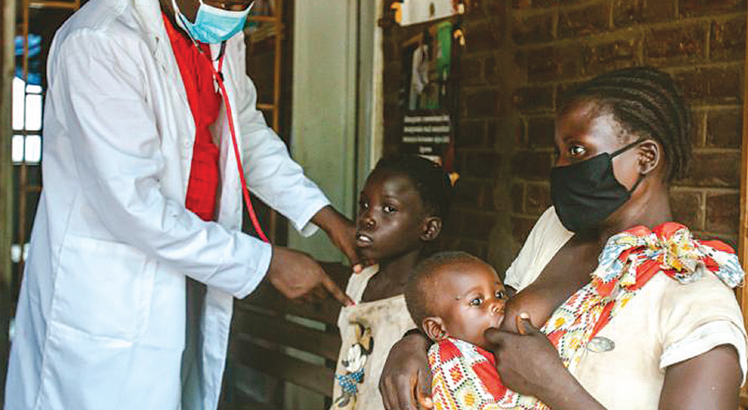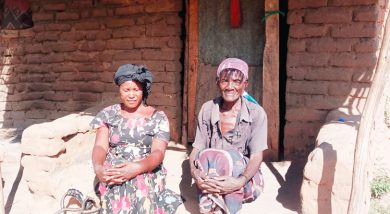Storm Ana disrupts healthcare services
Our Staff Writer JAMES CHAVULA details how flooding and strong winds affected children and families in Chikwawa, the worst-hit districts so far.
Lucy Victor’s nine-year-old daughter Etinala contracted malaria and desperately needed treatment. But the nearest health centre at Bereu in Chikwawa had been hard-hit by the tropical storm and services had ground to a halt.
The pair, from a village near Bereu Health Centre in Chikwawa, was among tens of thousands of Malawians impacted by tropical storm Ana in January, leaving the hospital flooded with water and mud.
The cyclone slammed Southern Africa in January, leaving dozens dead, 158 people injured and 23 000 families

mother feeds a baby
“This is the third time we’ve been here,” said Victor, another child strapped to her back. “The first time the health center was under water. The second, there was no one in sight. But today we saw some health workers coming back.”
Inside the near-deserted health facility in Chikwawa, the country’s worst affected district, consultation rooms were soiled with mud and vaccine fridges stood empty.
Two days after the storm hit the Southern Region, health workers at Bereu had evacuated vaccines to Chikwawa District Hospital since they lose their potency when exposed to higher temperatures than the recommended limit.
Precious Mlongoti, medical assistant in charge of the rural health centre, said essential supplies on lower shelves had been soaked and local people living with HIV wouldn’t be able to restock on antiretroviral drugs anytime soon.
“The floods destroyed drugs, masks and documentation. All services were disrupted. Emergencies had to be referred to Chikwawa district hospital,” said Mlongoti.
Since the cyclone struck, similar scenes have played out at health centers in neighboring Nsanje district, where floodwaters destroyed power lines, further impacting medical facilities.
Charles Kalemba, commissioner of the Department of Disaster Management Affairs (Dodma), said devastation in the Lower Shire districts of Chikwawa and Nsanje was far greater than first estimated.
“The impact of the floods is too big, but at Dodma we are not sleeping. Day and night, we are trying to reach out to affected people and provide some support,” he explained.
To provide relief, Unicef is supporting the Government of Malawi to assess the damage caused by the floods and conduct relief efforts in affected areas.
The UN agency has provided water, sanitation and hygiene (Wash) supplies to evacuation camps occupied by some of the 23 000 displaced families.
The items include items for personal hygiene and water treatment chemicals as well as health kits which were prepositioned in flood prone districts before the disaster struck.
UNICEF Representative Rudolf Schwenk, the UN’s interim Resident Coordinator, consoled thousands of Malawians affected by floodwaters.
“The current floods are a reminder that the climate crisis is very much a reality and vulnerable people are the most impacted by severe weather events,” he said.
“We need to go beyond disaster risk reduction and increase investment in community-led, sustainable resilience and response systems.”
Back at the flooded health centre in Chikwawa, Victor was hopeful that her daughter would receive malaria treatment as soon as possible as she could not afford the long journey to Chikwawa District Hospital. The disease transmitted by mosquitoes is widespread in the Shire Valley and it mostly kills women and children.
“This facility is my only hope. It’s our lifeline to medical services because you cannot postpone illness, even when disasters strike,” said the woman, whose house was reduced to rubble by the floods.





